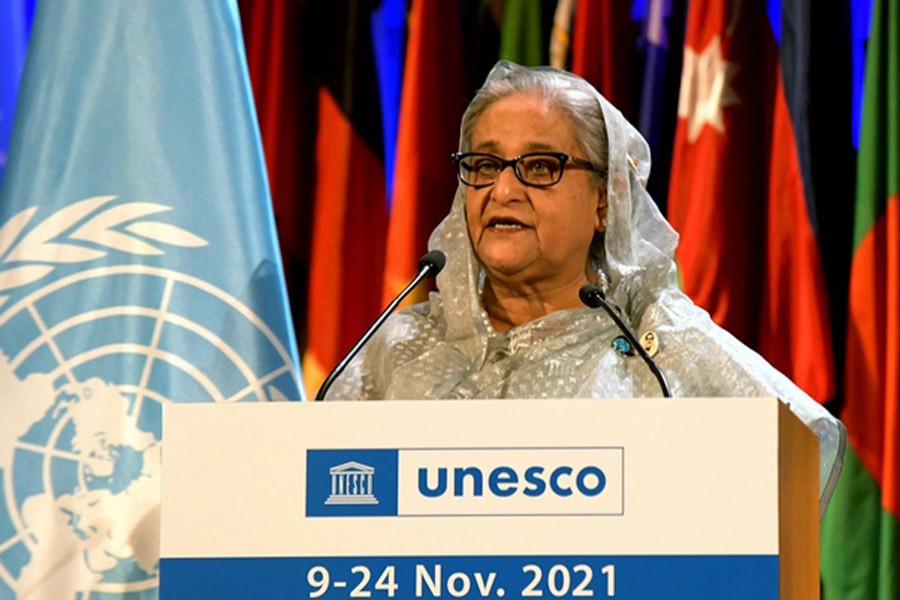Bangladesh wishes to contribute to global socio-economic development and technological advancement despite its limited capacity and investments in the creative economy can help it do so, Sheikh Hasina has said.
The prime minister addressed a ceremony in Paris to hand over the UNESCO-Bangladesh Bangabandhu Sheikh Mujibur Rahman International Prize for the Creative Economy on Thursday, reports bdnews24.com.
She described UNESCO’s decision to establish the award as the “most befitting tribute” to Bangabandhu’s contribution to global humanity and peace.
“Moreover, what Bangladesh is today so different from what it was during the early years of independence is due to his visionary leadership and legacy.
“While humbly acknowledging the kind support of the international community in the development of our country over the decades, we also wish to contribute to the socio-economic development and technological advancement for the betterment of the global community despite our limited capacity.
“We believe that investment in the creative economy will result in the realisation of the collective aim of furthering socio-economic development and technological advancement.”
She hoped that the international prize would strengthen further UNESCO’s effort in the field of the creative economy contributing towards its global priority, that is, gender equality and the priority of the youth as a group.
“This UNESCO-Bangladesh Bangabandhu Sheikh Mujibur Rahman International Prize will surely create a knowledge-sharing mechanism by capturing, celebrating, and communicating the best practice in the development of creative entrepreneurship.”
The MoTIV Creations Limited of Uganda won the maiden prize. It was selected from 69 nominations and will receive $50,000 in recognition of its innovative work to promote youth entrepreneurship in the creative economy. Located in Kampala, MoTIV is an integrated creative studio that fosters collaboration in an impactful and sustainable way through providing tools and training.
Hasina, the eldest daughter of Bangabandhu, said the event coincides with the International Year of Creative Economy for Sustainable Development declared by the United Nations.
She thanked UNESCO Director-General Madame Audrey Azoulay and other officials, particularly Assistant Director-General for Culture Ernesto Ottone Ramirez and his team in the 2005 Convention Secretariat, for their efforts to make the event a success.
The prime minister congratulated all the member states and officials of UNESCO on the eve of its 75th anniversary.
She noted Bangladesh is also celebrating the golden jubilee of independence and the birth centenary of Bangabandhu. UNESCO is officially associated with the celebrations.
Hasina said Bangabandhu was a strong advocate of multilateralism. He treated the United Nations as the “centre of peoples’ future hopes and aspirations”. He had similar sentiments and attribute for UNESCO.
“As his elder daughter, I had closely watched him, and can confidently attribute Bangabandhu as a true advocate of UNESCO. The actions of Bangabandhu Sheikh Mujibur Rahman toward promoting linguistic and cultural diversity and investing in peace are similarly central to all fields of UNESCO's mandate.
“Moreover, his policy decisions and establishing institutions in the field of education, culture, science and technology and leadership in establishing democracy as the cornerstone of governance in a newly-independent country are directly linked to UNESCO´s core objectives.”
Hasina quoted Bangabandhu from his speech while receiving the Julio-Curie Medal for Peace in 1973: "World peace is the principle (objective) of my life. I am with the oppressed, the abused, the exploited, (and) the peace-loving, freedom-loving people, no matter where they are. We need peace in the world. Peace should be sustained. We believe in peaceful co-existence."
The prime minister described the steps taken by Bangabandhu for the education of children. “Bangabandhu believed that expenditure on education was the best investment and declared free schooling for girls up to grade eight.”
In a war-ravaged country with many economic challenges, he nationalised over 36,000 primary schools and more than 150,000 teachers and employees across the country. “This simple example reveals his priority for education and a knowledge-based society.”
“My government has given priority to education. We have established a primary school in almost every village. More than 13.03 million primary students are supported by stipends.”
“The investment in education has started giving dividends. Bangladesh has made impressive progress in socio-economic fronts during the last decade,” Hasina said.
Hasina also recalled the tragic end of Bangabandhu’s life when he was working to establish Bangladesh as an economically self-reliant country, free from hunger, poverty and illiteracy.
“The defeated and reactionary forces of the Liberation War brutally assassinated him along with 18 of his family members and close relatives. It included my dear mother, three brothers with the youngest only 10 years old, two sisters-in-law. Only my younger sister, Sheikh Rehana and I survived the carnage as we were away abroad at the time. We could not return to home for 6 years and lived abroad as refugees.”
After coming back home, Hasina said, she has devoted her life to fulfilling the vision of Bangabandhu of a happy and prosperous Bangladesh.


